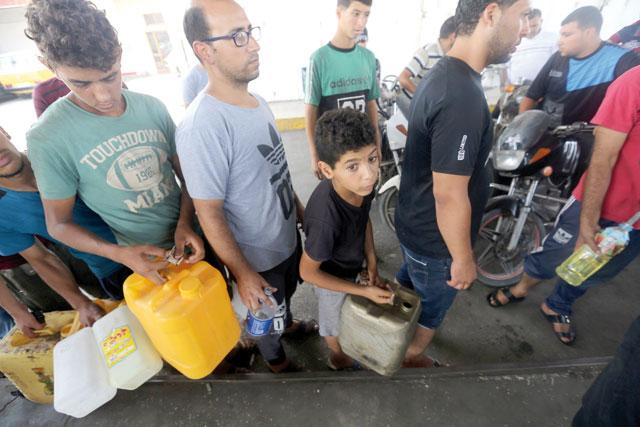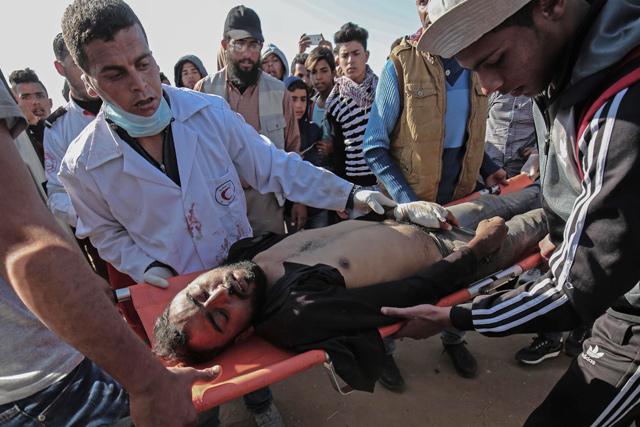You are here
Gazans pitch protest tents on Israel border as tensions mount
By AFP - Mar 29,2018 - Last updated at Mar 29,2018

A Palestinian woman takes a selfie ahead of a protest in a tent city along the Israeli border with Gaza, demanding to return to their home land, east of Gaza City, on Thursday (Reuters photo)
GAZA CITY, Palestinian Territories — Palestinians in Gaza pitched tents near the volatile border with Israel on Thursday ahead of a six-week protest camp under the gaze of wary Israeli forces.
The exceptional protest is dubbed "The Great March of Return" and has the backing of the Gaza Strip's resistance leaders, Hamas.
The protest comes amid rising tensions as the United States prepares to move Israel’s embassy to Jerusalem.
Organisers said it would be peaceful, but Israeli officials are wary of a fresh flare-up along the enclave's border.
Armed forces chief Lieutenant General Gadi Eisenkot has warned of escalating tensions along Israel's borders, "especially among the Palestinians".
Eisenkot said reinforcements, including more than 100 special forces snipers, had been deployed to the Gaza frontier and the army was prepared for all scenarios.
"We won't allow mass infiltration into Israel" or damage to the border barrier, he told the Yediot Aharonot newspaper.
The first protest will kick off on Friday when Palestinians worldwide mark Land Day, commemorating the killing of six unarmed Arab protesters in Israel in 1976.
Camping and protests in Gaza are expected to continue until mid-May, around the time the US is set to inaugurate its controversial new embassy in Jerusalem.
Mid-May will also mark the anniversary of the Nakba, or catastrophe, which saw hundreds of thousands flee their homes in the 1948 war surrounding the “creation of Israel”.
According to the United Nations, some 1.3 million of Gaza’s 1.9 million residents are refugees or their descendants.
‘Return home’
Khaled Al Batsh, part of the committee planning the protest, said tents would be located 500 metres from the border, just outside the buffer zone between Gaza and Israel.
Water facilities were being installed and medical teams deployed to allow people to stay for long periods.
Organisers said tens of thousands of people would attend Friday’s protest, although it was not clear how the estimate was reached.
Batsh said protestors were calling for Palestinians to be allowed to return to land that is now “inside Israel”.
“70 years ago we left and today we have decided to return to our country,” he told AFP.
But senior Hamas figure Salah Bardawil said that while protesters might breach the border, they were not planning to do so.
Hamas officials say they will monitor the area beyond the camp sites to prevent protesters going too close to the frontier, at least during the initial days of the protest.
Five main camp sites have been set up, spanning the length of the coastal territory from near the Erez border crossing in the north to Rafah in the far south, near Egypt.
Campers will be within sight of the border, frequently patrolled by Israeli forces.
On Thursday, around 20 family tents were pitched at a site near Erez, alongside two larger community tents for performances including the traditional Palestinian “dabke” dance.
At another site, young men were putting the finishing touches on dozens of wooden toilets, while large generators whirred into life.
Another organiser, Tahir Sawirki, told AFP Palestinians would gather Friday in groups representing the towns they left in 1948.
He said tens of thousands of meals would be prepared for more than 100,000 expected participants.
The White House’s decision to recognise Jerusalem as Israel’s capital, in a break with decades of international diplomacy, infuriated much of the Arab world.
Palestinians claim the city’s Israeli-annexed eastern sector as the capital of their future state.
The Palestinian leadership cut ties with the administration of President Donald Trump after he announced the move.
On Wednesday, Israeli tanks fired at Hamas positions in Gaza after heavy gunfire from the enclave, roadside bombs targeting border patrols and an incursion by three armed Palestinians, who penetrated some 20 kilometres into Israel before being captured.
Two more Palestinians armed with knifes were detained after sneaking across the border on Thursday, Israeli forces said.
Related Articles
OCCUPIED JERUSALEM — Israel tightened its blockade of the Gaza Strip on Tuesday, partly over kites carrying firebombs to set alight Israeli
Hamas on Sunday prevented dozens of children orphaned during its 50-day war with Israel from entering Israeli territory in a pre-arranged trip, organisers and officials said.
OCCUPIED JERUSALEM — Israel rejected calls for an independent probe on Sunday after occupation forces killed 16 Palestinians and wounded hun


















